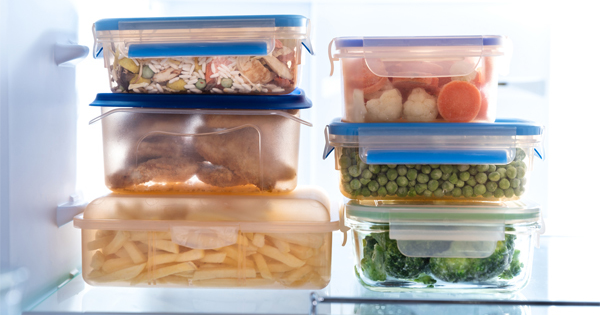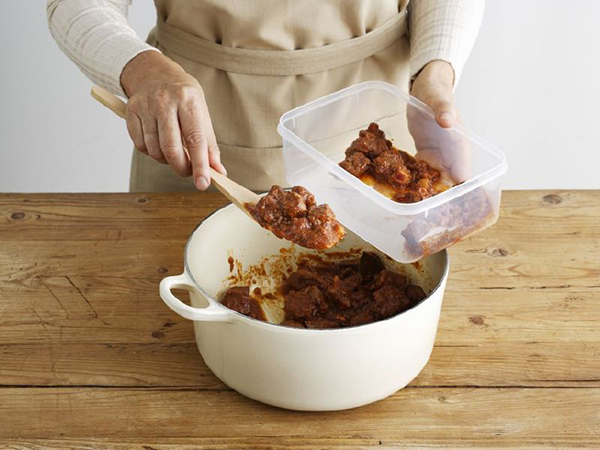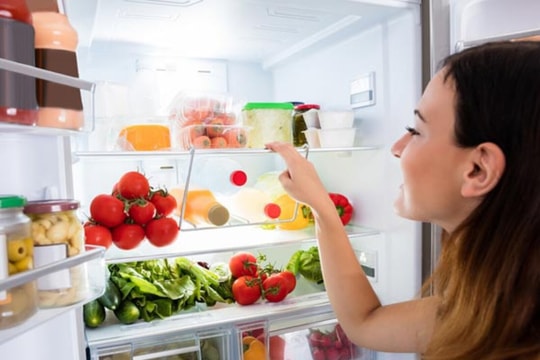How long does leftover food last in the fridge?
Overcooking or having little time to cook is the reason why storing leftovers in the refrigerator is so common in every household.
1. The risks of eating spoiled leftover food
If you prepare a lot of food or have little time to cook, storing food in the refrigerator is a good idea. However, you need to store it properly. Factors such as the type of food, the way it is prepared and the proper storage all affect the shelf life of leftovers.
First, food should be placed in airtight containers or sealed in storage containers to help prevent bacteria from entering, retain moisture, and keep the refrigerator free of food odors.
According to the U.S. Department of Health and Human Services, 3-4 days is the general rule of thumb for leftovers. Just because a leftover looks good for a few weeks doesn't mean it's safe. Eating leftovers that are past their expiration date or haven't been heated enough can put you at risk for food poisoning, with symptoms like nausea, vomiting, stomach cramps, diarrhea, fever, and more.
It's important to note that certain foods, such as undercooked animal products (meat, chicken, eggs, and seafood), are more likely to contain bacteria that can cause illness.
People at higher risk of food poisoning include: People 65 years of age and older; Children under 5 years of age; Pregnant women; People with weakened immune systems such as those with diabetes, liver or kidney disease, HIV or cancer.
If you want to extend the shelf life of your food, store it in the freezer. Once thawed, if you don't eat it all, the safest thing to do is throw it away.

2. Storage time of some foods in the refrigerator
Fruits and vegetables
According to the US Food and Drug Administration (FDA) guidelines, fruits and vegetables should be washed under running water and stored in a clean refrigerator at a temperature of 40 degrees F (4.4 degrees C) or below.
Refrigerated fruit should be eaten within 1-3 days for maximum flavor and freshness. Cooked potatoes and other vegetables can be safely stored in the refrigerator for 3-4 days.
Some fruits, such as apples, produce ethylene when they ripen, a gas that can cause other foods to ripen sooner or rot faster if stored together. For example, apples cause other fruits to ripen faster because they produce high amounts of ethylene. So apples should not be stored in the same storage container as other fruits.
However, not all fruits and vegetables are sensitive to ethylene. Cherries, pineapples, garlic, grapefruit... can be safely stored with or next to other items that produce this gas.
Milk and eggs
According to the United States Department of Agriculture (USDA), raw eggs can be safely stored in the refrigerator for 3 to 5 weeks. Hard-boiled eggs can be stored for a week. You should store eggs and dairy products at 40 degrees Fahrenheit or slightly below.
Dairy products have different shelf lives depending on the type of product. Yogurt can be stored for 1-2 weeks; soft cheeses and cottage cheese can be stored for a week; hard cheeses can be stored for 3-4 weeks after opening.
Poultry
Cooked poultry and processed poultry products such as chicken nuggets or patties can last 3-4 days. Packaged, sliced, and opened canned meat can last 3-5 days; Cooked, wrapped ham can last a week or 3-5 days if sliced.
Fish and shellfish
According to the FDA, cooked fish will last for 3-4 days and smoked fish will last for up to 14 days. Shellfish that has been opened will last for up to 3 days and cooked shellfish that is still in the shell will last for up to 2 days in the refrigerator.
Bread
The USDA recommends that commercially baked bread and rolls be kept in the refrigerator for 1 to 2 weeks. Do not eat bread that shows signs of mold.
Cold salad
Cold salads (such as egg salad, chicken, ham, tuna, and pasta) can be safely stored in the refrigerator for 3 to 4 days.
Dessert
The shelf life of desserts in the refrigerator varies. According to the USDA, store-bought or homemade cookies can last up to 2 months in the refrigerator, and moist desserts like cheesecake can last up to a week.

3. Tips for safely storing food in the refrigerator
To ensure safe consumption of cooked food, cooked food should be refrigerated within 2 hours of cooking and consumed within 3-4 days. Food should be stored in airtight containers or zip-lock bags. Keep the refrigerator at the appropriate temperature (4°C or lower) to avoid food spoilage.
Different areas of the refrigerator should be used for different types of food. Meat and dairy products should be stored on the top shelf, while produce and cooked foods should be stored on the lower shelves. Label the container or bag with the name of the food and the date it was cooked, and be sure to remove any unused leftovers from the refrigerator if they have passed their safe use-by date.






